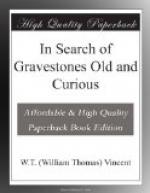but indifferently employed, and the inference is that
the clergy have in times past been wofully ignorant
or lamentably careless as to their powers and obligations.
A more healthy system now prevails, and we seldom
or never find anything in the way of ornament, emblem,
or inscription of an offensive or ridiculous character
placed in any of our burial-grounds, the Burial Boards
being as strict and watchful over the cemeteries as
the rectors and vicars are in the management of the
churchyards. Nor has there been, so far as we
have gone, any difficulty in reconciling this stringency
of supervision with the Acts of Parliament which have
been passed in recognition of religious equality at
the grave; and it is not too much to hope that there
is in the present day such universal prevalence of
good taste and propriety under the solemnity of death
as to ensure concurrence among all sects and parties
in securing decorum in all things relating to interments.
To the incongruities which have been left to us as
legacies from our ancestors we may be indulgent.
They are landmarks of the generations which created
them, and records of times and manners which we would
fain believe that we have left behind in these days
of better education and better thought. They are
therefore of value to us as items of history, and,
though we would not repeat many of them, we shall
preserve them, not only because we reverence the graves
of our forefathers, but because they are entitled
to our protection as ancient monuments. However
uncouth they may be in design or expression, they
must be tolerated for their age. It cannot be
denied that some of them try our patience, in the epitaphs
even more perhaps than in the carvings, and “merely
mock whom they were meant to honour.” Two
out of a vast number may be selected as painful evidences
of a departed century’s tombstone ribaldry.
The first, from a village near Bath, is a deplorable
mixture of piety and profanity, sentiment and vulgarity:
“To the memory of Thomas and Richard
Fry, stonemasons, who were crushed to death, Aug.
the 25th, 1776, by the slipdown of a wall they
were in the act of building. Thomas was 19 and
Richard 21 years.
“They were lovely and
pleasant in their lives, and in death
were not divided.
“Blessed are they that
die in the Lord, for their works follow
them.
“A sacred Truth:
now learn our awful fate.
“Dear Friends, we were first cousins,
and what not:
To toil as masons was our humble lot.
As just returning from a house of call,
The parson bade us set about his wall.
Flush’d with good liquor, cheerfully
we strove
To place big stones below and big above;
We made too quick work—down
the fabric came;
It crush’d our vitals: people
call’d out shame!
But we heard nothing, mute as fish we
lay,
And shall lie sprawling till the judgment
day.
From our misfortune this good moral know—
Never to work too fast nor drink too slow.”




